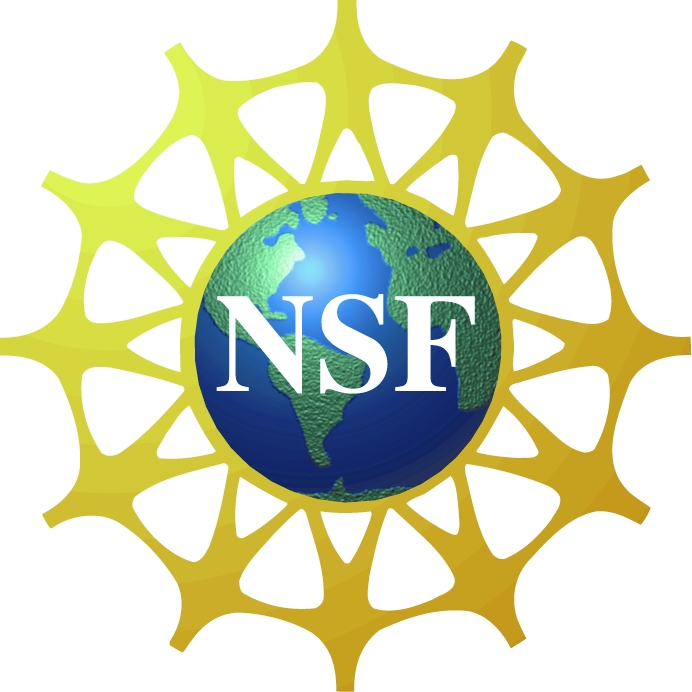Difference between revisions of "Main Page"
m (→What's New) |
(Acknowledgment and Disclaimer) |
||
| Line 1: | Line 1: | ||
<big>'''Geospace Environment Modeling (GEM)'''</big> [[Image:NSF_Logo_color.jpg|100 px]] | <big>'''Geospace Environment Modeling (GEM)'''</big> [[Image:NSF_Logo_color.jpg|100 px]] | ||
| − | Geospace Environment Modeling (GEM) is a broad-based, community-initiated research program on the physics of the Earth's magnetosphere and the coupling of the magnetosphere to the atmosphere and to the solar wind. The purpose of the GEM program is to support basic research into the dynamical and structural properties of geospace, leading to the construction of a global Geospace General Circulation Model (GGCM) with predictive capability. This GGCM model will be modularized and will complement parallel developments of magnetohydrodynamic models. The strategy for achieving GEM goals is to undertake a series of campaigns and focus groups, in both theory and observational modes, each focusing on particular aspects of the geospace environment. | + | Geospace Environment Modeling (GEM) is a broad-based, community-initiated research program on the physics of the Earth's magnetosphere and the coupling of the magnetosphere to the atmosphere and to the solar wind. The purpose of the GEM program is to support basic research into the dynamical and structural properties of geospace, leading to the construction of a global Geospace General Circulation Model (GGCM) with predictive capability. This GGCM model will be modularized and will complement parallel developments of magnetohydrodynamic models. The strategy for achieving GEM goals is to undertake a series of campaigns and focus groups, in both theory and observational modes, each focusing on particular aspects of the geospace environment. |
The Geospace Environment Modeling (GEM) program is sponsored by [http://www.nsf.gov/div/index.jsp?div=AGS National Science Foundation (NSF) Division of Atmospheric and Geospace Sciences]. | The Geospace Environment Modeling (GEM) program is sponsored by [http://www.nsf.gov/div/index.jsp?div=AGS National Science Foundation (NSF) Division of Atmospheric and Geospace Sciences]. | ||
| Line 9: | Line 9: | ||
* The three new Focus Groups selected in December 2009 are ''Dayside FACs and Energy Deposition'', ''Radiation Belts and Wave Modeling'', and ''The Magnetosheath''. | * The three new Focus Groups selected in December 2009 are ''Dayside FACs and Energy Deposition'', ''Radiation Belts and Wave Modeling'', and ''The Magnetosheath''. | ||
* The Volume 19, No.2 of the '''GEMstone''' newsletter has been published and is posted on [http://gem.epss.ucla.edu/mediawikiwiki/index.php/GEMstone the GemStone page]. Issue No.2 contains the final reports from two Focus Groups. | * The Volume 19, No.2 of the '''GEMstone''' newsletter has been published and is posted on [http://gem.epss.ucla.edu/mediawikiwiki/index.php/GEMstone the GemStone page]. Issue No.2 contains the final reports from two Focus Groups. | ||
| + | |||
| + | == Acknowledgment and Disclaimer == | ||
| + | This GemWiki site is supported by the National Science Foundation under Grant No. 0903107. Any opinions, findings and conclusions or recommendations expressed at this web site are those of the authors and do not necessarily reflect the views of the National Science Foundation (NSF). | ||
Revision as of 14:56, 29 July 2010
Geospace Environment Modeling (GEM) 
Geospace Environment Modeling (GEM) is a broad-based, community-initiated research program on the physics of the Earth's magnetosphere and the coupling of the magnetosphere to the atmosphere and to the solar wind. The purpose of the GEM program is to support basic research into the dynamical and structural properties of geospace, leading to the construction of a global Geospace General Circulation Model (GGCM) with predictive capability. This GGCM model will be modularized and will complement parallel developments of magnetohydrodynamic models. The strategy for achieving GEM goals is to undertake a series of campaigns and focus groups, in both theory and observational modes, each focusing on particular aspects of the geospace environment.
The Geospace Environment Modeling (GEM) program is sponsored by National Science Foundation (NSF) Division of Atmospheric and Geospace Sciences.
What's New
- The next GEM Summer Workshop will be held in Snowmass, Colorado during June 21-25, 2010 (with student workshop on June 20). Please see the program and logistic details at the GEM Workshop Web Site.
- The three new Focus Groups selected in December 2009 are Dayside FACs and Energy Deposition, Radiation Belts and Wave Modeling, and The Magnetosheath.
- The Volume 19, No.2 of the GEMstone newsletter has been published and is posted on the GemStone page. Issue No.2 contains the final reports from two Focus Groups.
Acknowledgment and Disclaimer
This GemWiki site is supported by the National Science Foundation under Grant No. 0903107. Any opinions, findings and conclusions or recommendations expressed at this web site are those of the authors and do not necessarily reflect the views of the National Science Foundation (NSF).